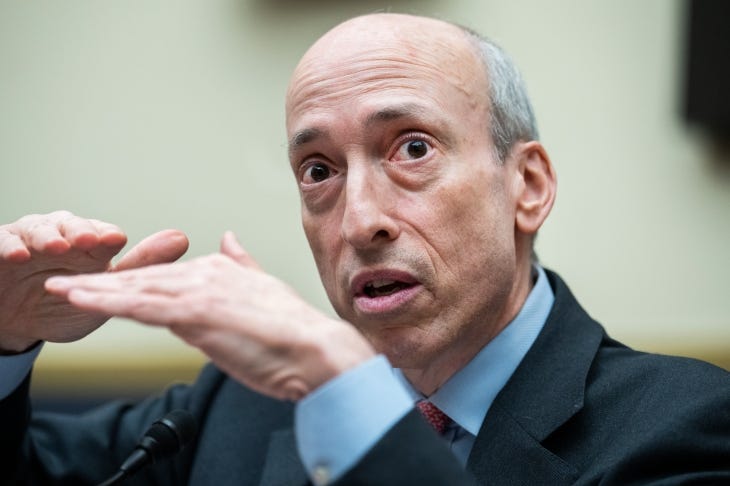What does the SEC's crypto enforcement mean for NFT loyalty programs?
Real stock ownership with strong shareholder communities is the new frontier

June has been a challenging month for the crypto industry with the SEC introducing lawsuits against Coinbase and Binance for operating as Unregistered Securities Exchanges, Broker Dealer and Clearing Agencies. In the press release of the Coinbase suit, Gurbir S. Grewal, Director of the SEC’s Division of Enforcement stated:
You simply can’t ignore the rules because you don’t like them or because you’d prefer different ones: the consequences for the investing public are far too great. As alleged in our complaint, Coinbase was fully aware of the applicability of the federal securities laws to its business activities, but deliberately refused to follow them. While Coinbase’s calculated decisions may have allowed it to earn billions, it’s done so at the expense of investors by depriving them of the protections to which they are entitled. Today’s action seeks to hold Coinbase accountable for its choices.
As part of the enforcement action, the SEC deemed that 68 cryptocurrencies that were being traded on Coinbase and Binance were securities which effected over $100B worth of digital assets.
Separately on June 20th, EDX Markets (EDX), a new crypto exchange backed by Fidelity Digital Assets, Charles Schwab and Citadel Securities, announced its equity fundraise which could signal a new era of institutional involvement in Bitcoin and Ethereum and an inflection point for any businesses seeking to engage their communities with unregulated NFTs. Many large brands over the last several years hopped onto the crypto bandwagon, utilizing NFTs as a new form of customer engagement and leveraging the allure of crypto community governance and ownership to foster brand loyalty. A few notable examples include:
Nike launched "Nikeland", a micro metaverse built within the Roblox platform, which is seen as one of the early metaverse platforms. The virtual environment is inspired by Nike's original headquarters and offers users the ability to try on virtual products, buy NFTs, and participate in mini-games for rewards. According to Roblox, Nikeland attracted nearly 21 million visitors in its first year but it is unclear if there is repeat engagement and if traffic was simply a result of the Roblox platform’s overall growth.
The Mastercard Artist Accelerator combines the power of blockchain with the timeless passion for music and a first-of-its-kind curriculum for both artists and fans. The free, limited-edition Mastercard Music Pass NFT was available to music and Web3 fans, and saw over 73,000 users participate, but there has been no announcements of future NFT activations.
Starbucks began rolling out their Odyssey digital asset extension to their loyalty program over the last several months which allows members to engage in “journeys,” a series of omnichannel activities, such as playing interactive games or taking challenges. Members are rewarded for completing journeys with a digital collectible “journey stamp.”
NBA Top Shot was launched at the height of the NFT boom but the rapid rise in popularity and subsequent fall has left many holders with significant losses. An overproduction of new NFT ‘moments’ diminished perceived scarcity and contributed to a decline in values. Earlier this year, Dapper Labs, the technology partner behind NBA Top Shot, Cryptokitties and others, received a class-action lawsuit accusing it of selling unregistered securities.
Blockchain, cryptocurrency, and NFTs have held the promise of revolutionizing community and capital to foster a sense of innovation, exclusivity and engagement that many brands find appealing. But the real beauty of these crypto strategies aren’t the technology or the digital art, it is the idea they embody: A paradigm shift towards community-driven value, ownership, and digital participation.
However, with the current uncertainties looming over the crypto landscape, many organizations that pursued NFT strategies find themselves at a crossroads. The question is now, why continue to invest marketing resources in an increasingly uncertain crypto future when regulated ownership and governance, such as stock ownership, can offer a viable and potentially more fruitful avenue? Stakeholder Labs is bringing to the table the best of both traditional finance and digital worlds, and interestingly, the average retail investor seems to be looking for the same thing:

The individual the stock tickers of Microsoft and Nvidia (which have experienced stock price increases of ~40% and ~200% YTD respectively) are now receiving as much as more Google search volume as NFTs. What could this mean? Let’s refer back to our interview with NIRI LA Chapter President Kimberly Esterkin, who recently researched an article on the evolution of retail investors and discovered that ‘meme stocks’ and NFTs appear to just be the entry point into the broader financial system:
They're [retail investors] not just buying GameStop and AMC and calling it a day and wreaking havoc for the CEO of those companies. Maybe they started there because that's where the bandwagon was going, but now they've invested in other areas. So I think those were some of the interesting ones [interviews] is the change in the mindset of IROs and Executive teams and Boards and the self-education that's been driven amongst the retail [shareholders].
The uncertainty in crypto doesn’t spell the end of digital community engagement. On the contrary, it provides a renewed opportunity to embrace real ownership, regulated financial systems, and bring back the focus on people, community, and shared success. And the opportunity is immense. When customers, not just own a product or service, but also a piece of the company that offers it, it can convert transient customer relationships into stable, meaningful partnerships. This is the core premise of Stakeholder Labs' mission and technology: Harnessing the power of ownership to build communities and foster loyalty. Our goal is to redefine brand engagement by allowing businesses to tap into the most committed and dedicated group of digital first, brand ambassadors there is - their own shareholders.



